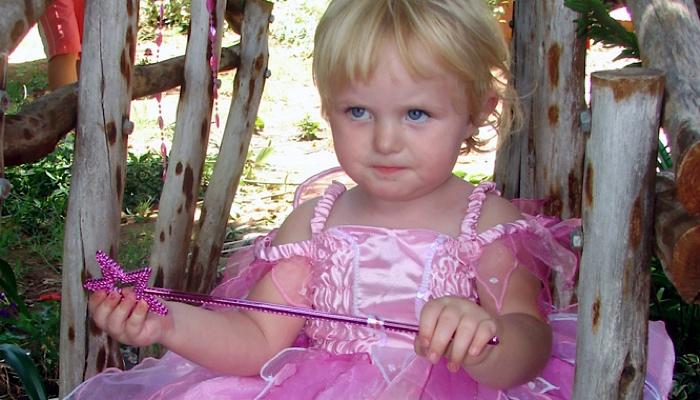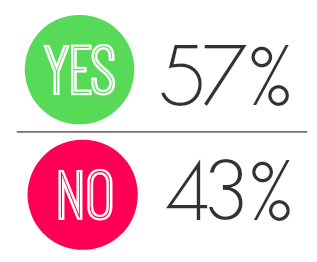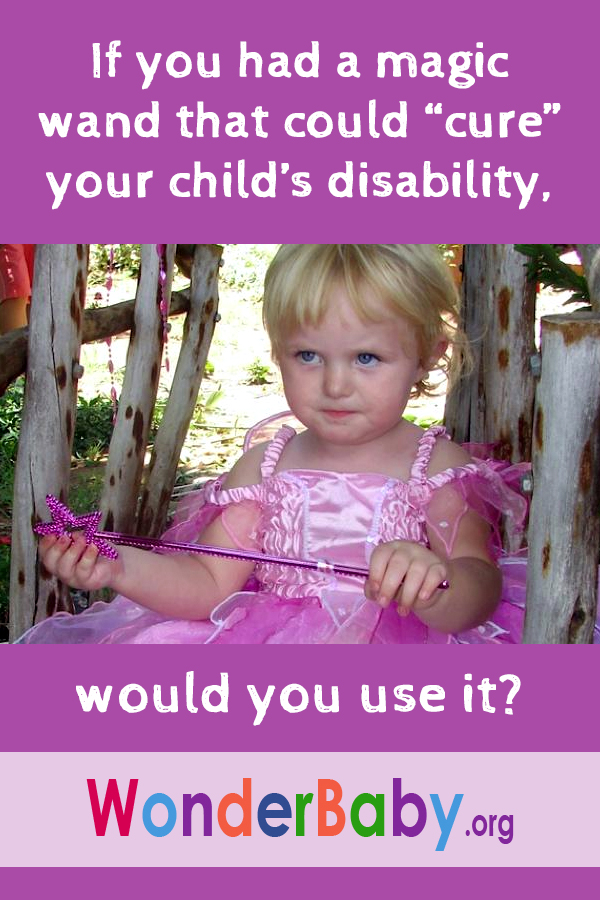If you had a magic wand that could “cure” your child’s disability, would you use it?

I often look at my son and think one word: PERFECT. He is perfect. I feel it in the core of my being and I love every aspect of his personality. I wouldn’t change him. He’s amazing and the world is a better place because he’s in it.
But, if you told me I could wave a magic wand and “cure” his disabilities (he is blind, can’t speak and is in a wheelchair), would I do it? Yes, in a heartbeat. Is that contradictory of me? Perhaps, but I also think a mother’s love can easily encompass both thoughts. I love him dearly just as he is, but I’d also do anything I could to make his life easier.
I recently asked this question to a group of special needs moms: “If you had a magic wand that could ‘cure’ your child’s disability, would you use it? Why or why not?”
The breakdown might surprise you: It was a nearly evenly split. 43% said no and 57% said yes.

But of course the conversation was more in depth than that. Here are some of the responses:
Yes!
“This is a difficult one, I have five children: two are typical and three with special needs. I love all of my children the same, love what they have done and who they are becoming, their personalities, their fight for life in this world. With that being said, yes I believe I would wave that wand for them. I would want to take away their everyday struggles, the pain and frustration they have with just the simple things. Knowing how much love my children with Joubert Syndrome have especially towards their baby brother who also has JS. Knowing my sons would make wonderful husbands and fathers, but most likely will never have that chance. I want to see my daughter be an amazing wife and watch her carry her babies, which most likely she will never be able to experience. Them actually being able to have a conversation with their friends and being able to be understood. And being able to take that next step as a child and having sleep overs and going to friends houses. Having family members actually understand your precious child instead of saying to a five year old that until he is potty trained that he isn’t allowed to come over and stay the night with his siblings anymore. To watch both sides of our family spend time with my children as they do the ones that don’t struggle every day. That being said, my children are the best thing about me I love that look when they learn something new or when their face lights up when their dad walks in the house from work. A child with special needs takes you back, makes you sit back and not take as much stuff for granted that everyone else does. People may think we are crazy and they say every day I don’t know how you do it. I say I do it because they are mine no matter what and I love them and I wouldn’t change them ever they are beautiful just the way they are. I just want to give them a little extra that everyone deserves, I would fight my last breath for all of my children and I have.”

“While having a blind daughter doesn’t bother me and I treat her just like I would a sighted child, I would wave the magic wand. Yes, she is happy and can succeed in life with my parenting and her drive. Yes, she isn’t missing what she never had and she knows nothing other than her blindness. BUT, I feel totally confident in saying that gaining sight would improve her life in countless ways. Even if she doesn’t know that, I know that. She could drive and live anywhere. Right now, there are places (like our hometown) that would not suit her because there isn’t public transit. Sight would help her socially in so many ways. Right now, it is hard for her to always know when she can join a conversation. I see little kids waiting for her to make eye contact and that hurts me so deeply. We walk through our grocery store and I see her fellow schoolmates and I always hear the same thing, “There’s that blind girl.” While I wish people could understand and be accepting, that is just never going to happen in any society totally. As a mother, and with the love I have for my girl, that will always hurt. She could view art and movies. On our adventures traveling as a family she could have her breath taken by the amazing views of this world (This alone is reason enough for me to want her to have sight). She may not miss these things, but the immense joy they bring me is enough to know that I would want her to share this with me and that it isn’t fair that she can’t. I would love for her to someday be able to give birth to her own daughter and see the beautiful face she created. Even just small tasks would be easier and improve her life, like being able to grocery shop and see the labels. I would never say these things to her and as a grown up I would never pressure her or make her feel bad if she didn’t want a cure someday, but being honest, part of me will always hope I get to show her the world and let her see how much she makes me smile. That is a mother’s love. Wanting everything for your child. Even if your child doesn’t need it, you want every opportunity and door to be open for them.”
Yes, but how would it work?
“Absolutely I would, yes! But then he would be much different. We’d have to get reacquainted to some extent. It’s the feeling I had when he was a newborn I met for the first time, and also the way it felt right after he had some surgeries that made a big difference developmentally. Still the same wonderful kid, just with some more abilities. I had to keep reminding myself of that. But yes, if that magic wand existed…. I wouldn’t keep anything back from him that could help him.”
“Yes, but there would be no rewind, meaning the change would start today. I love the person she has become even with her disabilities, but would be fascinated by what she would make of a future without them.”
Yes, because I have to think of the future.
“I wrestle with this in my head. Yes, I would have to go with yes, if only because I had him at age 36, and I can’t live forever. I would hope that it wouldn’t change his core personality, which is fabulous. But he is so low functioning and high needs, I would love for him to not be dependent on others if I could change that.”
No!
“Three years ago I would have screamed Yeah!…But now I wouldn’t change a thing. She is amazing just the way she is!”
“No! I don’t think I would. I would heal her liver and make her healthy, but I wouldn’t change who she is, she is such a love and such a sweetie.”
“I want to say yes, because I want her to ‘experience everything that we do,’ but then I remember that who she is is due largely in part to her noticing and bringing her attention to different things that sight might get in the way of. I love who she is exactly as she is. And she seems pretty darn happy with herself, too.”
“Perhaps BEFORE her personality was fully defined…I might have said yes. Now, at age 13, when she is a confident, fun-loving person with her own silly, unique personality… NO WAY. Plus, as a young lady who is blind, she gets to avoid ALL media images that tell women what beauty should be, all references to skin color and racism…she gets to just be herself.”
Would the magic wand really change your child?
“As much as we always say to not let a disability define a person, I feel like we are if we don’t at least offer a treatment or strive to make our children’s lives easier. How is ‘waving the wand’ different than losing the sight in the first place, if we are talking about who our children are? Yes, being completely blind has shaped the person that my son has become, but gaining sight wouldn’t change his past. He would be the same little boy, but with a whole new world to discover. I have three boys. My oldest is typical, my 4 year old is blind due to LCA, and my youngest was born with spina bifida. I see on a daily basis how my younger two sons are faced with more challenges than my oldest. I love who my boys are, but I would wave the wand in a heartbeat, if anything, just to give my children the same opportunities and freedom that the rest of us have. As far as we know, my middle son’s form of LCA doesn’t cause any other medical problems. When I consider my youngest son’s diagnosis of spina bifida, I always have a nagging worry in the back of my mind, because his entire body is effected. He may never walk, is at high risk for bladder/kidney problems, and has a shunt in his brain to prevent fluid build-up. He was born this way, but if I could take his physical issues away, I would, knowing that he is the same, sweet little boy… but without the unfair hand he was dealt!”
What if there really is a magic wand???
When talking about “curing” blindness, we may not have to wait for a magic wand. In fact, there are many new treatments being developed every year! So, when it comes to curing blindness, this may no longer be a philosophical discussion. We’re moving from science fiction to pure science!
Arielle Silverman, herself a blind adult, asked a group of blind young professionals if they would consider a treatment for blindness if it bore no medical risks or side effects. Here are some of their answers (and parents take note… many of them say no):
“My answer would be no, I probably wouldn’t do it. Why bother? I’m grateful for my life as it is without getting another sense. I don’t know if it’s an age thing entirely, because I know some people who have been blind since birth who would be first in line to get eye sight. My answer would have been the same as it is now at age 16 or earlier. I really wouldn’t want to do it. I’m proud of who I am as a blind person, I’m honored to be familiar with blind culture, and I value diversity. I think that if I randomly decided to get rid of that part of me in order to increase convenience in some areas of my life, I would be sacrificing too many beautiful parts of my identity.”
“I would without thinking about it.”
“I know when I was younger I would have been all over getting sight back. Some of it was because of the usual adolescent desire to fit in, but it was also due to the fact that I didn’t have training or an abundance of positive blind role models. Now though, I consider sight as something I don’t need. Sure, it might make some things easier… maybe. And well, sure, I’d be interested in experiencimg it… maybe. But the learning curve would be ridiculous: Learning a whole new way of traveling, reading, interacting with my environment… Nah, I’m all set.”
“I would do it without so much as a second thought and hold onto my long white cane as a souvenir. To be clear: I’m confident in my blindness skills and ability to figure out alternative techniques when I need to, for the most part blindness is only a minor barrier that is relatively easy for me to jump over. However, I’m tired of most people acting under the assumption that blindness is pretty much my main, if not my only, defining characteristic, so I would be thrilled to give up that implicit part of blindness which I really have no control over. Also, having good vision would, I think, be useful in a lot of ways.”
“For me, I’d have to learn how to be a competent independent sighted person. Its ironic, but true. Also, folks have mentioned blindness being an integral part of who they are, and it is the same for me. I devote so much time and energy to working with blind people because I can identify, because I’m there myself. Were I to magically become sighted, would I be that effective? Would the blind youth at Chemistry Camp etc. still look up to me as someone who is overcoming the challenges they are facing? Not likely. I’d probably have to change my whole focus. In short, no!”
“No, because I don’t think I could ever adjust to life as a sighted person. I have lived my life as a blind person and have lived a good life and I am not sure if I could ever mentally except my life as a sighted person.”
“No. I don’t think I’d take it. Maybe for curiosity’s sake, but I’m a blind person and have been for nearly 24 years. If I was sighted, I’d be expected to read print, drive a car, and using my other senses to do things wouldn’t be acceptable. I already know how to read, use a cane and a guide dog, and enjoy what my other senses tell me about the
world. Plus, like someone else said, working with blind peopple and to change things to make a more accessible world would be different as a sighted person. And I’m happy to have my current place in all that.”
“My parents have been adamant about me getting cured if it was possible and I’ve always been against it for all the reasons people have voiced above. But now, as I live more and more independently, I’m thinking that it might be a good thing to just make things a little easier. I wouldn’t have to depend on readers or other help that I use once in a while, I could drive which would make a big difference especially in where I could live, dating would be easier because I wouldn’t have to deal with people’s stereotypes, and just other social things could be better. I could go to a loud and crowded club without worrying about getting disoriented. But I’m not fully on board with sight because my blindness is such a big part of my identity and because I also feel that I was made blind for a reason. So I guess I’m open to the idea of a cure, but I wouldn’t jump at it.”
Read this article in Arabic: حيوا-السيدة-العمياء

Related Posts

Eye Conditions and Syndromes, Visual Impairment
Neuralink Announces Plans to Restore Sight to the Blind with Brain Chip
Elon Musk’s company Neuralink has announced plans to begin human trials of its new “Blindsight” brain chip by the end of 2025.

Special Needs
5 Spring Cleaning Tips for Families of Children with Disabilities
Spring cleaning is an opportunity to create a more accessible, organized, and supportive space for your child with disabilities. Declutter, deep clean, and refresh!

Visual Impairment
The Gift of Understanding: How a Young Child Helps His Blind Father Navigate Life
When a parent is blind, it’s natural for people to wonder how their sighted child will adapt. Will they struggle to understand their parent’s needs? Will they feel burdened by...